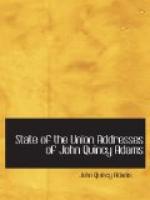Such, then is the present condition of the trade that, useful as it is to both parties it can, with a single momentary exception, be carried on directly by the vessels of neither. That exception itself is found in a proclamation of the governor of the island of St. Christopher and of the Virgin Islands, inviting for three months from August 28th, 1827 the importation of the articles of the produce of the United States which constitute their export portion of this trade in the vessels of all nations.
That period having already expired, the state of mutual interdiction has again taken place. The British Government have not only declined negotiation upon this subject, but by the principle they have assumed with reference to it have precluded even the means of negotiation. It becomes not the self respect of the United States either to solicit gratuitous favors or to accept as the grant of a favor that for which an ample equivalent is exacted. It remains to be determined by the respective Governments whether the trade shall be opened by acts of reciprocal legislation. It is, in the mean time, satisfactory to know that apart from the inconvenience resulting from a disturbance of the usual channels of trade no loss has been sustained by the commerce, the navigation, or the revenue of the United States, and none of magnitude is to be apprehended from this existing state of mutual interdict.
With the other maritime and commercial nations of Europe our intercourse continues with little variation. Since the cessation by the convention of June 24th, 1822, of all discriminating duties upon the vessels of the United States and of France in either country our trade with that nation has increased and is increasing. A disposition on the part of France has been manifested to renew that negotiation, and in acceding to the proposal we have expressed the wish that it might be extended to other subjects upon which a good understanding between the parties would be beneficial to the interests of both.
The origin of the political relations between the United States and France is coeval with the first years of our independence. The memory of it is interwoven with that of our arduous struggle for national existence. Weakened as it has occasionally been since that time, it can by us never be forgotten, and we should hail with exultation the moment which should indicate a recollection equally friendly in spirit on the part of France.
A fresh effort has recently been made by the minister of the United States residing at Paris to obtain a consideration of the just claims of citizens of the United States to the reparation of wrongs long since committed, many of them frankly acknowledged and all of them entitled upon every principle of justice to a candid examination. The proposal last made to the French Government has been to refer the subject which has formed an obstacle to this consideration to the determination of a sovereign the common friend of both. To this offer no definitive answer has yet been received, but the gallant and honorable spirit which has at all times been the pride and glory of France will not ultimately permit the demands of innocent sufferers to be extinguished in the mere consciousness of the power to reject them.




